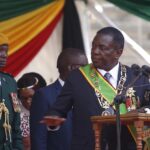HARARE – A power struggle is brewing within Zimbabwe’s ruling ZANU–PF party, as the battle to succeed President Emmerson Mnangagwa intensifies. Billionaire businessman Kudakwashe Tagwirei is emerging as a frontrunner, but faces opposition from war veteran Chris Mutsvangwa, who has issued a strong warning against Tagwirei’s ambitions.
ZANU-PF spokesperson Chris Mutsvangwa is emerging as the only senior figure publicly opposing businessman Kudakwashe Tagwirei’s presumed presidential ambitions.
Since March, Tagwirei, a key ally and financier of President Emmerson Mnangagwa, has stepped out of the shadows, embarking on a countrywide charm offensive. He has met with church leaders, youth groups and ruling party loyalists, all while praising Mnangagwa’s leadership and publicly aligning himself with the president’s vision.
Some senior Zanu PF officials are reportedly lobbying for Tagwirei to be parachuted into the 300-member central committee and politburo, amid claims that he has President Emmerson Mnangagwa’s backing to succeed him.
But Mutsvangwa, himself a presidential aspirant, says Tagwirei will face a “challenge” if his target is Zanu PF’s top job.
Mutsvangwa’s reaction betrayed growing discomfort in Zanu PF over the controversial millionaire tycoon’s growing influence in the party, and his reported ambitions to be president.
Speaking to journalists in May at the party’s Harare headquarters, Mutsvangwa cautioned against the trend of elevating business elites into positions of power within the party. He emphasised the importance of adhering to ZANU-PF’s internal democratic processes.
“Anybody is free to join Zanu PF, whether you be a businessman, a farmer, fisherman or whatever. If certain provinces feel that that person should become a central committee member and they send their recommendations, the party will consider those resolutions and will come out with an appropriate decision,” Mutsvangwa told a news conference on Wednesday when asked directly about Tagwirei’s ambitions.
“What would be wrong is to say I’m getting into the party so that I become this or that post, that I become the president, because that is not the purpose of joining the party. The purpose of joining the party is to follow the constitution of the party and see to it that when succession is done by votes, you comply with the tenets of that party.”
He continued: “It’s a mass party, it’s not a vanguard party, it allows everybody to come into the party. But if you come on a ticket that I want power, the people may see through what you want and that becomes a challenge. Hopefully all the businessman entrants who come through will come to serve the party and not to serve themselves because serving themselves will not take them anywhere in Zanu PF, I can vouch for that. Just like presidents who went haywire and we removed them, Zanu PF will winnow out any people with hidden ambitions other than following the strictures of Zanu PF.”
While Tagwirei enjoys Mnangagwa’s backing and vast financial resources, critics say he lacks the political savvy, grassroots structures and broad-based support required to mount a credible campaign.
Tagwirei may have the business acumen, but Masunungure says he lacks political dexterity and is entering a crocodile-infested pool.
Ngwenya agrees: “It would be risky for ZANU-PF to present him as a presidential candidate in 2028.”
Mnangagwa is bound by the constitution to serve only two terms. His second and final term ends in 2028, although his supporters are seeking constitutional amendments to keep him in power until 2030.
The 82-year-old, however, maintains that he will not stay in power a day longer than the constitution allows, and some Zanu PF insiders have briefed that while Mnangagwa may be genuine, that is not the full story.
The plan, they say, is to push through the constitutional amendments postponing elections due in 2028 and extending not only the president’s term by two years but also the life of parliament to 2030.
Effective 2023, Zimbabwe’s new constitution adopted in 2013 provides that in the event that the president resigns or is incapacitated, his party will select a successor to finish his term.
It is through this key provision, they say, that Mnangagwa will seek to influence the succession developments in Zanu PF.
The insiders said this was the thinking behind seemingly urgent moves to position Tagwirei in both the central committee and the politburo.
The plan relies heavily on Zanu PF succeeding with the constitutional amendments which legal experts say would require a public referendum, and what other Zanu PF leaders with ambitions to succeed Mnangagwa, like Mutsvangwa and Chiwenga, do in the interim.
A Mnangagwa supporter, an MP, told ZimLive he was familiar with the Zanu PF leader’s succession planning.
“The president believes that the era of leaders who went to the war is over, and it’s time for a young leader who must be given a soft landing to establish himself. That’s what 2030 is all about,” the lawmaker said.
Tagwirei, who made his fortune from state contracts, had not answered questions sent to him by ZimLive.
Analyst Rejoice Ngwenya is even more dismissive, arguing that Mutsvangwa lacks the political clout, integrity, and organisational structure to influence the succession within ZANU-PF. “Decisions are made in the politburo and the presidium. His populist rhetoric does not go that far.”
Mutsvangwa’s political challenge is further weakened by his fraught relationship with Vice President Constantino Chiwenga, who is also seen as a contender for the presidency.
Party insiders suggest Mutsvangwa’s recent outbursts may be an attempt to stay relevant and position himself for a lesser role, possibly the deputy presidency, should Mnangagwa’s succession plan fall apart.
“He’s just trying to insert himself in the thick of things,” one ZANU-PF source tells The Africa Report. “He’s not a serious contender. He’s just good at talking.”
Mutsvangwa has clashed with Mnangagwa repeatedly since the latter assumed office. He was sacked from the cabinet twice, first as special adviser to the president in 2018, and again in 2024 as Veterans of the Liberation Struggle Affairs minister.
He currently serves at the party headquarters, with little institutional backing.
“He lacks the finesse necessary to occupy and execute that office,” says Masunungure. “His turbulent relationship with Mnangagwa stems from his overly forward and abrasive attitude.”
While Mutsvangwa remains respected as a genuine war veteran, Ngwenya says he commands no real grassroots support: “His main role now is to praise Mnangagwa and neutralise dissent within the war veterans’ movement.”
The push to elevate Tagwirei has also reignited ethnic tensions within ZANU-PF. Under Mugabe, a Zezuru, the party was dominated by his ethnic kin. Mnangagwa, a Karanga, reversed that trend. Tagwirei, also Karanga, would continue the pattern, potentially alienating other factions and reviving intra-party fractures.
Masunungure says some may see this as an attempt to replace one Karanga with another to block a Zezuru resurgence, adding this could widen existing rifts within the party.”
Since the 2023 elections, ZANU-PF has been consumed by internal succession manoeuvres at the expense of public service delivery. Hospitals remain underfunded, civil servants are demoralised and basic infrastructure is crumbling.
According to Chengetai Guta, director of communications for the opposition Movement for Democratic Change-Tsvangirai, the ruling party has become a sophisticated monster devouring national resources and dividing citizens along tribal lines, all while war veterans and the general population are left in poverty.
“They do this at the expense of taxpayers’ money and mortgaging of national resources at the expense of positive national development,” he tells The Africa Report.
As 2028 looms, analysts say Zimbabwe’s ruling party is navigating a treacherous political transition. They argue Mutsvangwa’s rebellion may not halt Tagwirei’s rise, but it signals that ZANU-PF’s unity, long held together by liberation credentials, is beginning to fracture.

Follow @MyZimbabweNews











